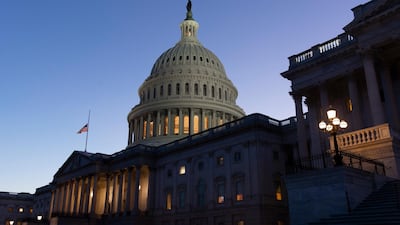US politicians seeking to block an arms sale deal to the UAE are motivated by opposition to President Donald Trump, not "substance and policy", the UAE ambassador to Washington, Yousef Al Otaiba, said on Tuesday.
Speaking with the Hudson Institute think tank, Mr Al Otaiba said Democratic senators were trying to block the $23 billion sale of 50 F-35 Lightning II aircraft and other hardware to the UAE in a "political" move against Mr Trump, who proposed the deal.
He said the F-35 deal showed how the UAE was “doubling down” on ties with the US.
“We are buying weapons with our own money to defend ourselves from a common threat," Mr Al Otaiba said.
"We are co-deploying with [US forces] everywhere you go. We just made peace with Israel. And so, on substance and policy, there's really very little argument against it.
“The most potent argument against it is the political one – that there's a lot of opposition because Donald Trump is the one selling arms to us.
"I think it really comes down to a political debate, not a substantial debate.”
Democrats have until December 11 to force a Senate vote on their legislation, which is sponsored by two of their senators and a Republican.
Any move to block the arms deal would probably be vetoed by Mr Trump.
Mr Al Otaiba also spoke of “seeds of progress” towards ending the Qatar crisis and of plans for an Israeli opera performance in Dubai.
In recent days, officials from Saudi Arabia and Kuwait have spoken on the progress being made in efforts to resolve the Qatar crisis.
Saudi Arabia, the UAE, Bahrain and Egypt have imposed a diplomatic, trade and travel embargo on Doha since 2017.
Mr Al Otaiba expressed cautious optimism that the rift, in which Qatar has been accused of fostering extremism in the region and becoming too close to Iran, could be nearing a resolution.
“I think there's definitely progress or at least there's seeds of progress," he said. "There's a lot of commitments on a lot of parties, members.
“Whether that holds, whether it doesn't hold, whether everyone's on board, I think it's still too early to tell.”
Mr Al Otaiba spoke of new cultural initiatives after the UAE and Israel signed the Abraham Accord in September, which normalised ties and opened the door to business, travel and security co-operation.
He said there had been an “overwhelming” rush of trade interest, plans for an Israeli performance at the Dubai Opera, and co-operation between a UAE ministry and Shalva, a charity for disabled Israeli children.
“There is really no reason for this stuff to not happen,” Mr Al Otaiba said.
“Opera performances, disabled children, Expo, trade, investment – you can have all that and still have a conversation about Palestine or about Iran or Turkey. But those two don't have to be mutually exclusive.”


